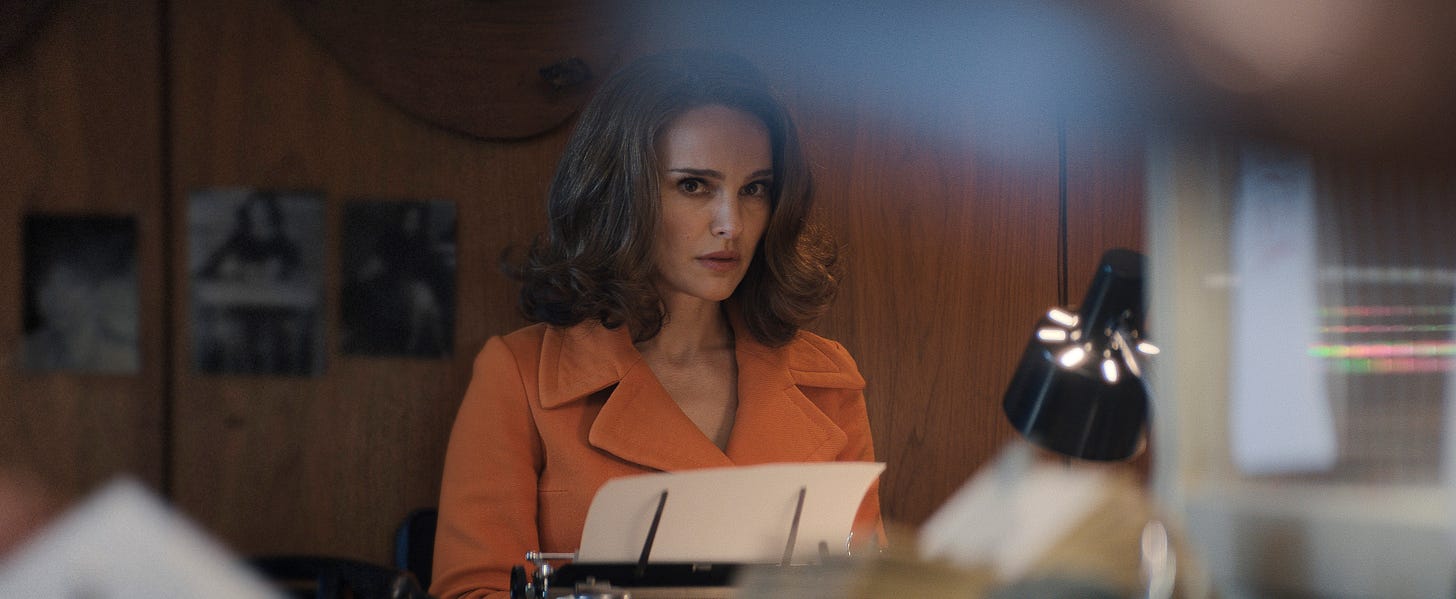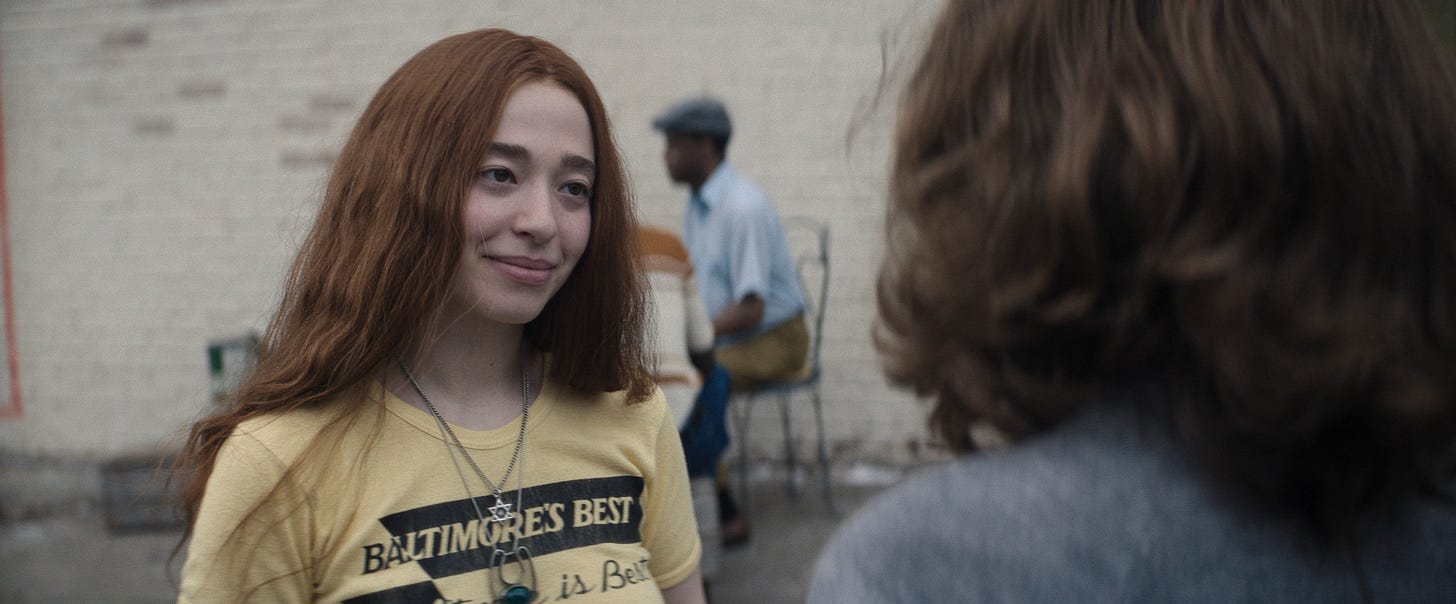As someone with almost a decade (oof) of experience writing about American Jewish representation in pop culture, I’ve often found myself asking, as much as it makes me cringe, “Is this good for the Jews?”
That question can have a lot of different meanings, but to me, when I’m writing about Judaism in pop culture, it means if a person with little to no knowledge of the Jewish experience, like so many people in this country who don’t live around or meet Jews every day, watched this, what would they learn about our culture and religion? Would they see us in a positive, or at least humane, light?
That question, along with so, so many others (because this show is a riddle, wrapped in a mystery, inside an enigma), haunted me while watching Apple TV+’s “Lady in the Lake,” the amazing first TV series directed by Alma Har’el and starring Natalie Portman as a Jewish housewife turned single mother and amateur journalist using the story of a Black single mother, Eugenia “Cleo” Johnson (played by Moses Ingram who I can’t rave about enough) to get ahead.
This show has so much of the minutiae of a very specific Jewish American experience — of a woman trapped with unfulfilled dreams in Maryland’s Pikesville Jewish community in the 1960s. And to the three main Jewish women in this show, parts of that identity are stifling.
Portman’s Maddie Schwartz, or Maddie Morgenstern as she’d rather be known, rails against the inherent sexism of the line “shelo asani isha” from the Jewish morning prayers, in which Jewish men thank God every day for not making them a woman. When she wants to join a search party with her synagogue to find a missing 10-year-old congregant, she’s told women can’t be part of it. Her husband doesn’t see how great a “balaboosta” she is, instead chiding her for using the dairy dishes for brisket.
Then there’s that disappeared 10-year-old girl, Tessie Durst. We don’t get many scenes with her, but she is the first character we meet, and one of the most pivotal ones. When we first meet her, she’s arguing about Christmas with her mother, not understanding why her family can’t celebrate it too. Her Jewish day school doesn’t seem to be encouraging her natural fascination with science, including with seahorses and fish — instead only teaching her what day of the week God created her.
The third main Jewish character, perhaps my favorite of the three, is Judith Weinstein, played by “Better Things” star Mikey Madison. She’s Maddie’s cheerleader and stoner confidante in her journey as a divorcee and aspiring journalist. She encourages her to find power in her writing, and introduces her (or maybe reintroduces her) to pot and Anais Nin. She’s a free woman that feels smothered and restrained by her Jewish family, and tries to get Maddie to let her move in with her to the dilapidated Bottoms apartment she rents from Judith’s family, where the younger Jewish woman sees so much magic and freedom.

Despite whatever feelings she may have about her Jewish home, Judith rocks an awesome big Jewish star necklace. Maddie is quick to tout her Jewish identity in interactions where she passes as just white — be it with white non-Jews or her new Black neighbors. And even Tessie, well, she’s doesn’t say she doesn’t want to be Jewish; she just wants her parents to buy her a seahorse. At the end of the day, all three of these Jewish female characters are fascinating, so well-drawn by Har’el, whether they get a lot of screen time or not.
Plus, getting to spend seven hours with Portman — who is also an executive producer on this show, who chose to be in this project because she’s so deeply connected to it as the granddaughter of Baltimore Jews and, like Maddie, is the descendants of people killed in camps during the Holocaust — is incredible.
I guess I should also mention a few other Jewish characters that take center stage. Maddie’s Jewish mom, whose mother and siblings perished in the camps, is very much a stereotypical Jewish mom, but we also see that those tendencies — her wanting her daughter to keep in line, not leave her marriage and look svelte — all come from a trauma-informed desire to survive. Maddie herself is a complex Jewish mom to her teenage son, Seth, played by Noah Jupe, whose world is shattered after he discovers a truth about his family while reading his mother’s diary on his bar mitzvah day, a discovery that puts into overdrive that usual teen disdain for your mother. And then there’s Brett Gelman’s Milton, Maddie’s (ex) husband who is, well, kind of a douche, a character Gelman seems to play so well, a man who wants a wife who will cater to him, who doesn’t really seem to see her as her own person. Milton wants a perfect Jewish wife and a picture perfect Jewish home with separate dishes, but that’s just not what Maddie wants in life.
Har’el and Portman have both talked about how Maddie’s character may be an example of what happens when the oppressed becomes the oppressor, and Portman has said that it’s fair for some to see her as a villain. In the narration, Cleo is often critical of Maddie, of her self-interested use of her story. And Maddie’s lack of journalistic scruples and ethics put her and others in danger.
After watching the finale, which I won’t spoil but which you can now stream, I think that Maddie, just like almost every character in this show, Black, white and Jewish, comes out as more complex than a simple villain. She’s a survivor of abuse, a woman with chutzpah, someone who would do anything for a story, sure, but also someone who knows what it means for other women and girls to see her succeed. If she is a Jewish villain, she is a complex and interesting one, the kind that I’ve wanted to see more on TV, someone who isn’t villainous because of any antisemitic stereotype, just a woman trying to get ahead in a world rigged against her.
So is “The Lady in the Lake” good for the Jews? OK, I hate myself a little for asking that question, but I think yes? Ultimately, this is a show helmed by two amazing creative Jewish women that has some of the most inventive, out-of-this-world TV scenes I’ve seen this year. It’s a feast for the eyes. It’s a show that lets each and every one of its actors shine in big and small moments. It keeps up the drama and suspense even for those familiar with the book it is based on. And these two women, Har’el and Portman, as Jewish creators, also make room for a complex portrayal of antisemitism and Jewish privilege that feels super timely, even if it is set in 1966. They gave us amazing, complex Jewish female characters to fall in love with and see part of ourselves in. I think it’s a win.
What do you think of the Jewish representation in “Lady in the Lake?” Have you finished watching the show? Were you happy with the finale? Let me know in the comments.






I hated the melodramatic antisemitism stereotypes and misogyny. I have never encountered Jews like these horrid characters and so lacking in depth.
well Now I have to watch it ... I was very on the fence about it .. will watch and give my opinion after I am done with the series.. Glad you motivated me to watch it.
Thanks ~Honi